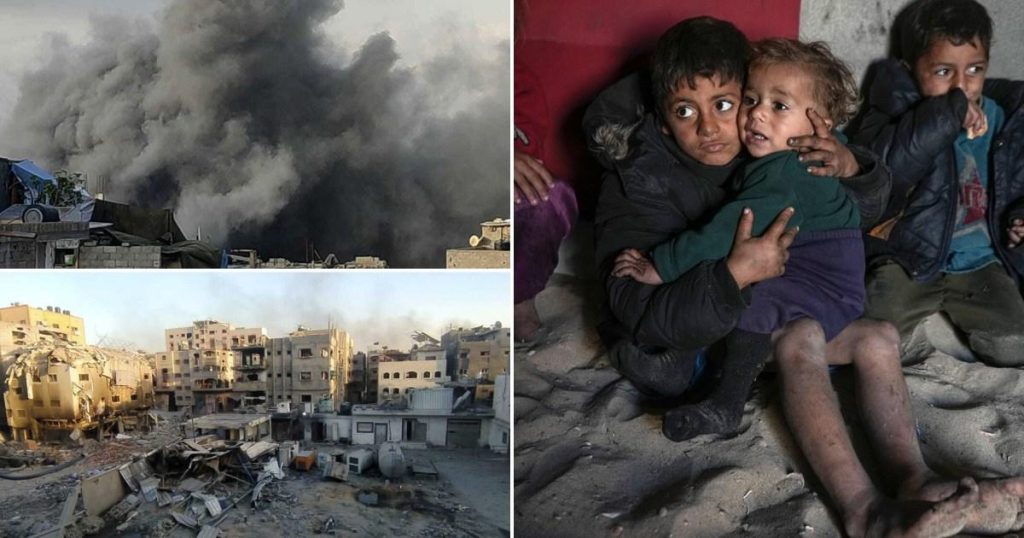The Kamal Adwan Hospital in northern Gaza, one of the last functioning medical facilities in the region, has been rendered unusable after Israeli troops forcibly evacuated patients and staff, subsequently setting fire to parts of the building. This incident marks a further escalation in the ongoing conflict between Israel and Hamas, exacerbating the already dire humanitarian crisis in the besieged territory. The Israeli military justified the operation by claiming the presence of Hamas fighters within the hospital, an assertion repeatedly made during the conflict. However, the action has drawn condemnation from international human rights organizations and raised serious concerns about the safety and well-being of Palestinian civilians.
The forced evacuation of Kamal Adwan Hospital involved a distressing scene where medical personnel and patients, including the critically ill, were compelled to assemble in the hospital courtyard and remove their clothing in the cold. Following this, fires were reportedly ignited in the hospital’s laboratory and surgical department, effectively disabling crucial sections of the facility. Audio messages from a hospital staff member described the chaotic and terrifying scene, with fires raging throughout the building and patients facing imminent danger. This account paints a grim picture of the conditions on the ground and underscores the vulnerability of civilians caught in the crossfire.
The incident at Kamal Adwan Hospital is not an isolated one. Israeli rights group Physicians for Human Rights-Israel had previously petitioned the High Court of Justice to halt military attacks on the hospital, warning that its forced evacuation would leave thousands of residents in northern Gaza without access to vital medical care. The organization has documented the deaths of five other hospital staff members due to Israeli fire since October, highlighting the precarious situation faced by healthcare workers in the conflict zone. The assault on Kamal Adwan follows a similar incident at the nearby Indonesian Hospital, which was also stormed and evacuated by Israeli troops.
Israel’s ongoing offensive in Gaza, launched nearly 15 months ago, has had a devastating impact on the territory’s healthcare system. The campaign, characterized by bombardments and ground offensives, has severely damaged or destroyed numerous medical facilities, further limiting access to essential healthcare for the already vulnerable Palestinian population. A year prior to the recent attack on Kamal Adwan, Israel conducted raids on several hospitals in northern Gaza, including Kamal Adwan, Indonesian, and al-Awda Hospitals, alleging that they served as Hamas bases. These repeated attacks on medical infrastructure have raised serious concerns about the respect for international humanitarian law and the protection of civilian facilities during armed conflict.
The broader context of the conflict underscores the severity of the humanitarian crisis in Gaza. The Israeli offensive, initiated in response to Hamas’s October 7, 2023 attack on southern Israel, has resulted in widespread displacement and devastation in the Gaza Strip. Over 90% of Gaza’s 2.3 million residents have been forced from their homes, seeking refuge in overcrowded and unsanitary tent camps. The siege imposed by Israel has drastically restricted the flow of essential supplies, including food and medical aid, into the territory, leading to widespread shortages and exacerbating the suffering of the Palestinian people. The UN has reported severely limited humanitarian access to northern Gaza, further intensifying the crisis.
The attack on Kamal Adwan Hospital epitomizes the devastating human cost of the ongoing conflict. The destruction of essential medical infrastructure, the forced displacement of civilians, and the constant threat of violence have created a humanitarian emergency in Gaza. The incident further underscores the urgent need for a peaceful resolution to the conflict and for ensuring the protection of civilians and civilian infrastructure, including hospitals, in accordance with international humanitarian law. The international community must play a more active role in mediating a ceasefire and addressing the underlying causes of the conflict to prevent further suffering and loss of life.


